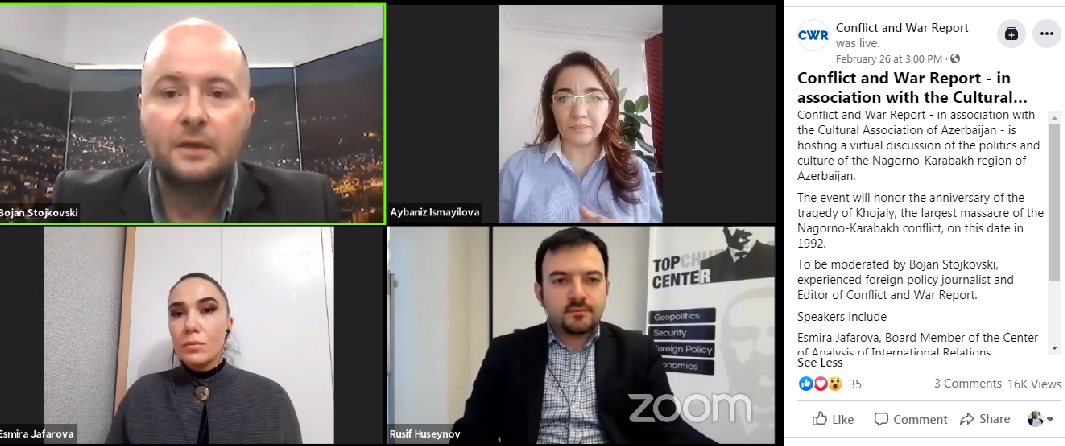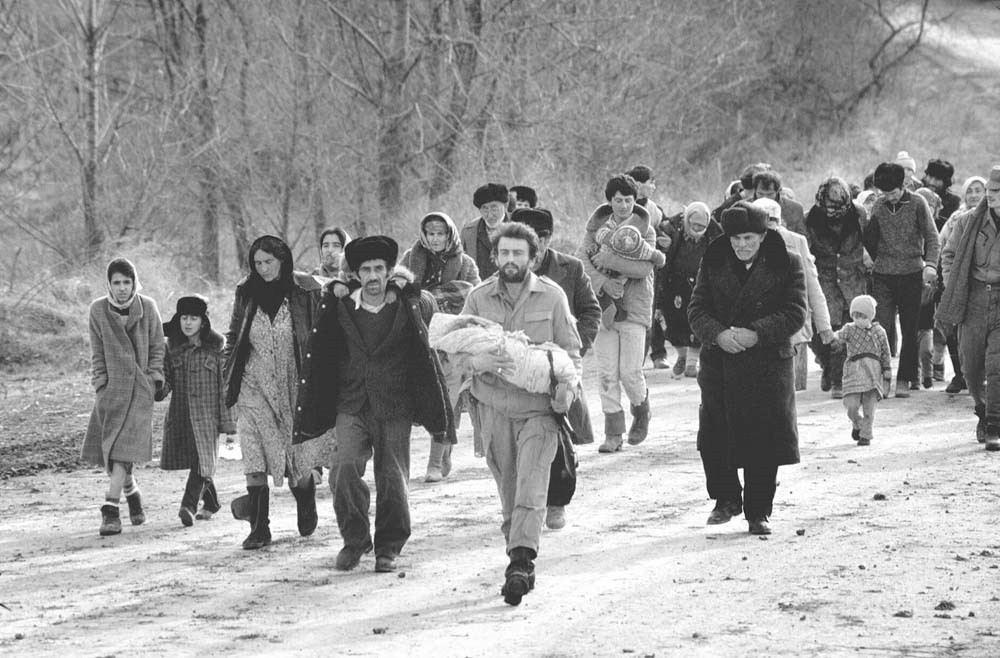While horrors of the Khojaly Massacre still continue to haunt the Azerbaijani community, Armenian authorities are far from acknowledging responsibility despite all the evidence of the incident. On the 29th anniversary of the tragedy, Azerbaijani officials and surviving victims reiterated their call for justice and for those responsible to be punished.
On February 26, 1992, with the Soviet Union newly dissolved, Armenian forces took over the town of Khojaly in the occupied region of Nagorno-Karabakh after battering it using heavy artillery and tanks, assisted by infantry. A total of 613 civilians were killed by Armenian soldiers in Khojaly, a strategically important settlement originally inhabited by 7,000 people. The attack killed 106 women, 63 children and 70 elderly people. The massacre is seen as one of the bloodiest atrocities by Armenian forces against Azerbaijani civilians in the region, which was mostly liberated by Azerbaijan forces last fall after decades of occupation, the Daily Sabah writes.
According to Rusif Huseynov, director of the Baku-based think tank, Topchubasov Center, the wounds from this tragic event are still fresh for the Azerbaijani nation.
“Although 29 years are dividing us from that terribly February night, the wounds it inflicted are still fresh and still felt in society. As the largest massacre in the course of the Nagorno-Karabakh conflict, it has joined an infamous list of Oradour-sur-Glane, Lidice, Khatyn and Srebrenica…For years the Khojaly has been signifying terror and mass murder, as well as lack of justice and indifference of the international community.” Huseynov tells Conflict and War Report.
Huseynov took part in the panel discussion that Conflict and War Report organized on Friday, addressing the 29th anniversary of the tragic event, and Nagorno-Karabakh prospects for the future. Speakers also included Esmira Jafarova, Board Member of the Center of Analysis of International Relations, and Aybaniz Ismayilova, Head of International Relations Department of the Nagorno-Karabakh Region of the Republic of Azerbaijan.
https://www.facebook.com/117158573522631/videos/256280936057789

Some 487 people, including 76 children, were critically injured, while 150 of the 1,275 Azerbaijanis the Armenians captured during the massacre still remain missing. Eight families were completely wiped out, 130 children lost their fathers, and some 25 children became orphans in the massacre. According to the investigations launched by the Azerbaijani government based on expert statements and the testimonies of 2,000 survivors, Armenian forces tortured the captives by burning them alive, slaughtering people, peeling off their scalps, cutting off ears, noses or sexual organs, and removing their eyes, alongside mass killings
Despite all the evidence, Armenian authorities are still far from acknowledging responsibility. One of the solutions for addressing such a tragedy would be to establish a special court that would trial the perpetrators of this heinous act, Huseynov explained.
“The Second Karabakh War has brought a long-awaited victory, which secured – albeit partially – the restoration of justice and Azerbaijan`s territorial integrity. Despite the outcome of the recent conflict, the Khojaly massacre has not been properly addressed. Perhaps the Azerbaijani society may feel some justice toward this tragedy once a Khojaly Nuremberg or Hague is organized to punish the perpetrators.” Huseynov said.
The head of the World Azerbaijani Congress also said Wednesday that the perpetrators of the massacre by Armenian forces in the town of Khojaly should be punished.
Asif Kurban said in a statement that Armenian armed forces, terrorist groups and the 366th Motorized Rifle Regiment of the Soviet Army committed an unprecedented genocide against civilians by violating all international legal norms and human rights.
“The images that were taken at that time and the stories of the survivors of the massacre show that there was a real genocide in Khojaly. Also, a document presented by 30 members of the Parliamentary Assembly of the Council of Europe signed on April 26, 2001, the report prepared by the Memorial Human Rights Organization on Khojaly and the reply letter of U.N. Human Rights Organization President Holly Cartner to the Armenian representative in 1997 prove that the Armenians committed genocide in Khojaly,” he added.
Underlining that the parliaments of 15 countries and 16 state assemblies in the U.S. recognized the genocide, he called on all parliaments to do the same.
“The ‘modern’ world of the 21st century is still silent and ignoring the Khojaly Massacre,” he said, adding Armenia violated its obligation to prevent genocide and the actions of its perpetrators since it had effective control over those who carried out the actions in Khojaly.
